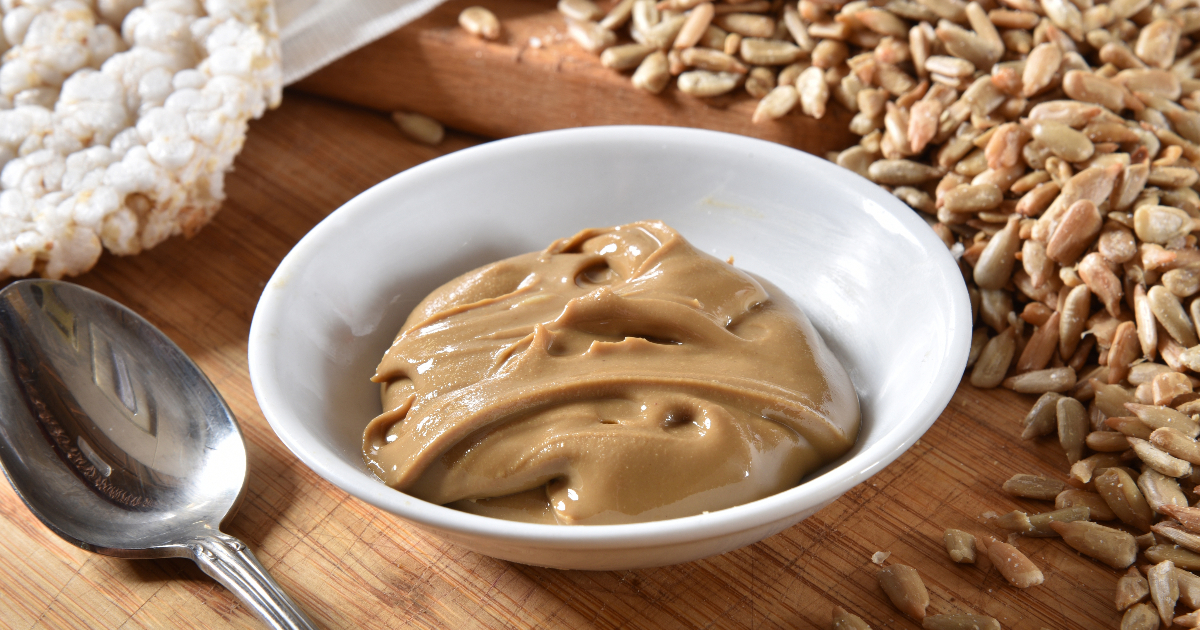Sunflower butter and almond butter have become increasingly popular peanut-free alternatives in recent years. Both spreads offer delicious flavor and creamy texture, making them suitable substitutes in recipes that call for peanut butter.

However, there are some notable differences between these two plant-based butters that are worth exploring.
Ingredients
Sunflower butter is made by grinding roasted sunflower seeds into a smooth paste. Some versions may contain added sunflower oil to improve consistency. Salt and sugar are also sometimes added for flavor. Sunflower butter contains no nuts or common food allergens.
Almond butter is made by finely grinding raw or roasted almonds into a spreadable paste. Most almond butter contains only one ingredient - almonds. However, some versions may contain added oils, salt, or sugar. Almond butter does contain tree nuts (almonds) so it is not suitable for people with tree nut allergies.
Both spreads can be found in creamy or crunchy textures. Crunchy versions contain small pieces of nuts or seeds for added texture.
Nutrition and Health Benefits
Sunflower and almond butter offer different nutritional profiles with their own set of health advantages.
Sunflower Butter

A 2 tablespoon serving of sunflower butter provides:
- Protein: 5.5g
- Fat: 17g
- Carbs: 7g
- Fiber: 2g
- Vitamin E: 40% DV
- Iron: 7% DV
- Magnesium: 25% DV
- Phosphorus: 21% DV
- Zinc: 10% DV
- Copper: 25% DV
Key benefits:
- High in vitamin E, an antioxidant that protects cells from damage.
- Good source of minerals like magnesium, phosphorus, zinc, and copper.
- Contains plant-based protein and fiber.
- No major allergens - safe for those with peanut/tree nut allergies.
Almond Butter
A 2 tablespoon serving of almond butter provides:
- Protein: 7g
- Fat: 17g
- Carbs: 6g
- Fiber: 3g
- Calcium: 11% DV
- Iron: 6% DV
- Magnesium: 22% DV
- Vitamin E: 37% DV
Key benefits:
- High in vitamin E, calcium, and magnesium.
- Provides plant-based protein and fiber.
- Rich in monounsaturated fats that benefit heart health.
Almond butter contains more vitamin E, calcium, protein, and healthy fats like monounsaturated fat compared to sunflower seed butter. However, sunflower seed butter provides more minerals like magnesium, phosphorus, zinc, and copper.
Taste and Texture
There are some clear differences when it comes to the taste and texture of these two spreads:
- Sunflower butter has a relatively mild, earthy, roasted flavor. The texture is smooth and creamy.
- Almond butter has an intensely nutty and sweet almond taste. The texture tends to be grainy or crunchy rather than smooth.
Sunflower butter is less sweet compared to almond butter. Its more subtle, savory taste makes it suitable for both sweet and savory recipes. Almond butter's distinctly nutty flavor works best in sweeter applications.
In terms of texture, sunflower butter is generally creamier while almond butter has some natural grittiness from the almond skins. Those who prefer a perfectly smooth spread may favor sunflower seed butter.
Cost
Sunflower seed butter is often cheaper than almond butter. A 16-ounce jar of sunflower butter typically costs between $7 - $10. Almond butter is more expensive, with a 16-ounce jar priced around $10 - $13.
The lower price point makes sunflower seed butter the more budget-friendly choice. However, almond butter enthusiasts feel the additional cost is worthwhile for its unique nutty taste and nutritional qualities.
Culinary Uses
Both sunflower and almond butter are highly versatile ingredients:
- Spread on toast or waffles
- Add to oatmeal or cereal
- Use in sandwiches and wraps
- Blend into smoothies
- Make sauces and dips
- Bake into cookies, bars, and other treats
- Eat straight out of the jar as a snack
Sunflower butter's mild taste allows it to seamlessly blend into both sweet and savory recipes. It can be used in place of almond butter in any recipe, although the flavor will be different.
Almond butter's distinctive flavor makes it ideal for recipes wanting that sweet nutty taste. It can work as a sunflower seed butter substitute, but its almond flavor will come through.
Those with nut allergies can safely enjoy sunflower butter in any recipe calling for almond butter or peanut butter. Almond butter should be avoided by anyone with tree nut allergies.
Sunflower Butter vs Almond Butter: Which is Healthier?
So which of these spreads is ultimately healthier? The answer depends on your specific nutritional needs:
- For a nut-free or peanut-free option, sunflower seed butter is the clear choice.
- If you require more vitamin E, calcium, or monounsaturated fats, almond butter is a better fit.
- Sunflower seed butter provides more minerals like magnesium, zinc, and copper.
- Almond butter offers more protein and fiber.
- Those limiting sugar should check labels, as sunflower seed butter more often contains added sugars.
Almond butter nudges ahead of sunflower butter in terms of overall nutrition. However, sunflower seed butter remains an excellent choice, especially for anyone avoiding tree nuts or peanuts.
Other Factors to Consider
Here are a few other factors to keep in mind when deciding between these two nutritious spreads:
- Allergies: Choose sunflower seed butter if you have tree nut or peanut allergies. Almond butter contains tree nuts.
- Environmental impact: Almond farming in California has faced criticism for its water usage. Sunflower production has a lower water footprint.
- Oxidation: Almond butter's monounsaturated fats can go rancid more quickly without stabilizers. Store-opened almond butter jars in the fridge.
- Added ingredients: Check labels if you want to avoid added sugars, oils, or salt. Look for options containing just nuts/seeds.
- Flavor: Those wanting an intense nutty almond taste may find sunflower butter too mild. Sunflower butter offers more versatility.
FAQs
Is sunflower butter healthier than almond butter?
Almond butter has a slight edge nutritionally thanks to its high amounts of vitamin E, calcium, monounsaturated fats, and fiber. However, sunflower seed butter also offers a solid nutritional profile and is free of major allergens. Those with peanut/tree nut allergies may find sunflower butter the healthier choice for them.
Can you substitute almond butter for sunflower butter?
Yes, almond butter can replace sunflower butter in recipes, but the almond flavor will come through. This may complement some dishes but overpower others. Sunflower butter makes an allergy-friendly sub for almond butter.
Is sunflower butter or almond butter better for weight loss?
Both contain about 190 calories and 17g fat per 2-tablespoon serving, so they are roughly equal for weight loss. Those watching carbs or sugar may favor almond butter, as sunflower varieties sometimes contain added sugar. As with any food, moderate portions control calories.
Does sunflower butter taste like peanut butter?
Sunflower butter has a milder, roasted, earthy taste compared to the nuttier and sweeter flavor of peanut butter. The creamy texture of sunflower seed butter closely resembles peanut butter. However, the flavors are noticeably different.
Can you use sunflower seed butter like almond butter?
Yes, sunflower seed butter can be used in place of almond butter or peanut butter in any recipe. The flavor will be more subtle and earthy. Those with nut allergies can safely use sunflower seed butter as an almond butter substitute.
Conclusion
Sunflower and almond butter both bring their own set of advantages to the table.
Choosing between them means weighing factors like nutrition, allergen status, taste, cost, and how you plan to use them.
Diets like vegan, paleo, keto, and food allergy lifestyles can all benefit from including these delicious and wholesome spreads.

